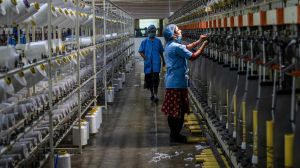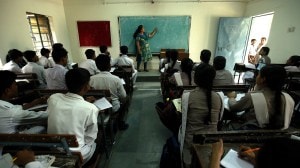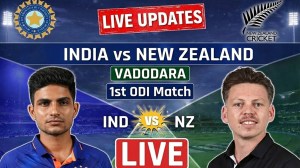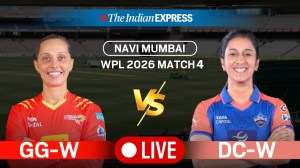High powered wrath yatra
The joke doing the rounds of Delhi is that L.K. Advani8217;s rath yatra is only between North Block and South Block. The two red stone buil...

The joke doing the rounds of Delhi is that L.K. Advani8217;s rath yatra is only between North Block and South Block. The two red stone buildings stand opposite each other within a distance of 150 yards, against the backdrop of Rashtrapati Bhavan. North Block accommodates the Home Ministry, headed by Deputy Prime Minister Advani, and South Block is where Prime Minister Atal Behari Vajpayee sits.
It is no secret that Advani would like to span the distance between North Block and South Block as soon as possible. It is his life8217;s ambition to be India8217;s prime minister, not an unnatural desire to nourish for any politician. But Advani also knows he cannot make the prime ministership even if Vajpayee vacates office. If Advani could he would have done it by this time.
Not long ago, the RSS 8212; which is dependent on Advani for all kinds of services to be rendered within the government 8212; launched a trial balloon to determine whether Advani would be acceptable. The BJP president, M. Venkaiah Naidu, was reportedly chosen for the task. At a meeting where Vajpayee and Advani were present, Naidu said that one was vikas purush development man and the other loh purush iron man. The exercise turned out to be a damp squib.
Vajpayee saw through the game and announced at that very meeting he would not be contesting the next election. The RSS was not prepared for such a sharp reaction. Naidu not only withdrew the remark but offered profuse apologies. Advani went on to announce that the BJP would go to the next polls under Vajpayee8217;s leadership.
However, there is no difference between Vajpayee and Advani when it comes to ideology, thinking or loyalty to the RSS. Probably the only difference is that the RSS uses Vajpayee discreetly while it makes Advani the base to launch any blatant movement, like the one against the Babri Masjid. If the former is the mukhauta mask of tolerance, as RSS ideologue K.N. Govindacharya put it, the latter is openly a proud torchbearer of Hindutva.
Vajpayee may have condemned mass murder in Gujarat more stridently than Advani but the prime minister has never considered the dismissal of the state chief minister, Narendra Modi. Of course, Advani gives him credibility by keeping quiet when Modi comes to the level of a street urchin, as he did during the yatra through Gujarat. Nonetheless, when the chips are down, both Vajpayee and Advani do not say anything to criticise people like Modi.
The RSS has implicit faith in both. The two were part of the team which it sent to Shyama Prasad Mookerjee, the Hindu Mahasabha leader, to request him to launch the Jana Sangh, the forerunner of the BJP. After Mahatma Gandhi8217;s assassination, the RSS had to give a guarantee to the then home minister, Sardar Vallabhhai Patel, that it would only be a cultural organisation and have nothing to do with politics. Only then was the ban on the RSS lifted.
Despite being a swayamsewak, Vajpayee has been able to project an image of a person who is accommodative and tolerant. It is evident from the elasticity with which he has run the 24-party NDA. True, he has allowed Advani to spread all over the government. But then, essentially, they are two sides of the same coin.
They are constantly in touch with each other. No decision is unilateral. Advani wears communalism on his sleeve. He gives the impression of a hardliner who would rather break than bend.
Whether the NDA would have chosen Advani in place of Vajpayee is a hypothetical question. It is apparent it would not have. Advani can gather adherents in his own party but not people with different points of view. He lacks catholicity in approach and finesse in dealing with the critics.
After the elections, the situation may not change. The old or new constituents of the NDA would not accept Advani as their leader if it ever came to that. One, his image does not go down well with their following. Two, he does not rise above the cussedness from which the constituent themselves suffer.
If ever the time for an NDA successor to Vajpayee came, Defence Minister George Fernandes would throw his hat into the ring. He has proved his credentials to the RSS. I recall when Vice-President Bhairon Singh Shekhawat was Rajasthan8217;s chief minister during the Janata Party rule, he told me Fernandes should be supported for the prime ministership.
Shekhawat, like many others, was sick of the perpetual wrangling between the then prime minister, Morarji Desai, and his home minister, Charan Singh. Advani8217;s rath yatra has not added a bit to his stature, if that was the purpose. He has used the yatra to reiterate that the party would build the Ram temple at the site where the Babri Masjid stood. But he has played this card earlier too, to the detriment of Muslims and the country.
While filing his nomination papers from Gandhinagar, he said relations between Hindus and Muslims have got strained in the past couple of years. It is an admission of guilt, because the BJP-led coalition has been ruling the country for six years. He said it was time for reconciliation. But he pointed out that the reconciliation could not be at the cost of appeasement.
Where is the evidence of appeasement? This is the propaganda on which the BJP has built its following. Muslims have been given no preference anywhere, neither in admission to technical institutions nor in jobs. They mostly live in ghettoes. Not many residential localities are willing to accommodate them. The nation has neglected even their education. They are probably at the lowest rung of the ladder.
Even if Advani by some miracle were to reach South Block, would he rise above his Hindutva agenda? Vajpayee is at least mistaken for a liberal at times.
- 01
- 02
- 03
- 04
- 05































